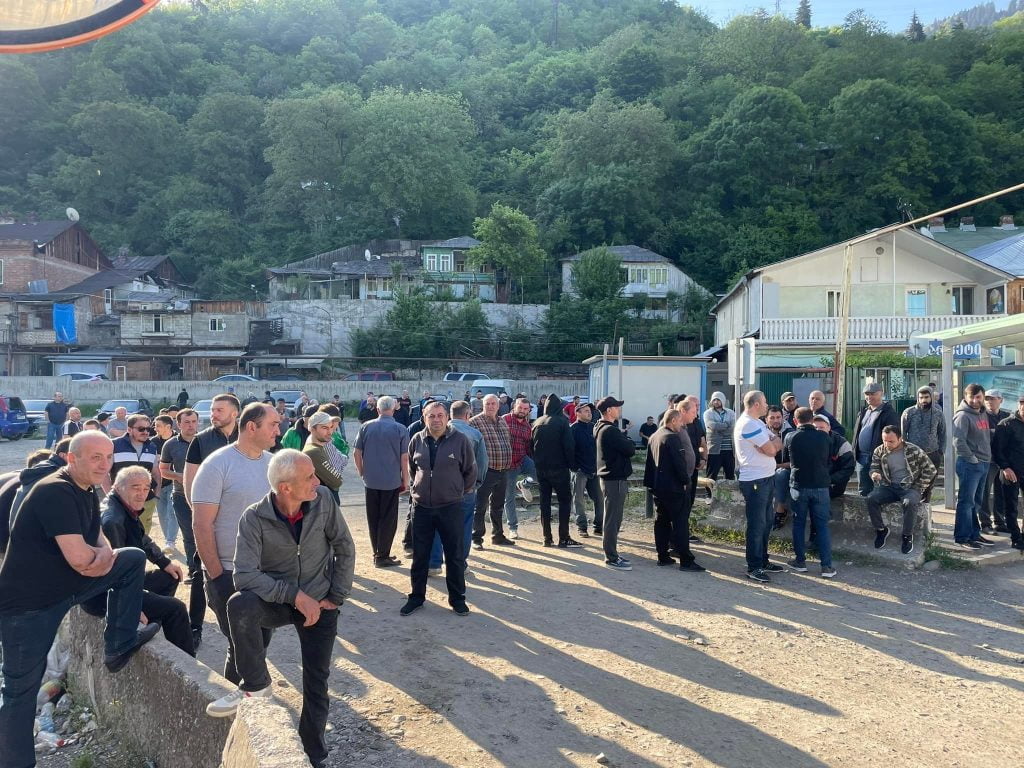Some 400 workers of Borjomi, Georgia’s Russian-owned mineral water giant, went on strike starting May 31 to demand the reinstatement of their 49 dismissed colleagues, the return of previous working conditions and 25% salary increase, among others.
The workers of the #1 and #2 bottling factories are also demanding the payment of delayed salaries, the open-end contracts, forming a collective agreement, the ending of “blackmailing and threatening” against outspoken workers, as well as prosecution of the company administration members allegedly involved in latter instances.
IDS Borjomi sacked 49 workers over failed remuneration negotiation earlier in May, a development following the indefinite suspension of production after its parent company got hit with international sanctions over Russia’s war in Ukraine.
Merab Akhmeteli, the director of Borjomi’s N1 bottling factory was cited by Netgazeti.ge online outlet as saying that the working conditions remain largely unchanged with only the system for calculating non-working hours altered. But he claimed the calculation is “still better than the established practice in the industry.”
“The company is in a most difficult situation today, accounts are frozen, production and more than 80% of exports are suspended. Today our main goal is to overcome the crisis and save the production,” Akhmeteli said.
“That’s exactly why we began the production with our minimal resources and workload so that we would not stop supplying the Georgian market,” he added, noting that they are giving the opportunity to non-striking employees “who are ready to work with the management to fight for the company’s survival.”
According to Akhmeteli, the two bottling factories currently employ some 630 workers in total.
Giorgi Diasamidze of the Labor, the trade union backing and representing 400 workers, rebuffed Akhmeteli’s remarks, stating that “in reality… the working conditions are worsening.”
In an interview with government-critical Formula TV, Diasamidze stated on May 31 that workers “are being threatened, blackmailed, and forced to sign on to inhumane conditions.”
“The strike will continue until better working conditions are attained,” he asserted.
The strike comes after a 21-day mediation, requested by the labor union, by the Ministry of IDPs from the Occupied Territories, Labor, Health and Social Affairs between the workers and the company ended without results.
Diasamidze has on his part come out to accuse the Georgian Government of protecting the IDS Borjomi while it “constantly violates the law.”
Against the backdrop of the alleged violations, the labor union head told Formula TV, that the Government “has an obligation to defend” the workers.
He argued that the Government has publicly taken a stance not to intervene in the dispute, but “in reality, something completely different is happening.”
The workers have reported that they had been privately contacted “from certain state agencies” not to go on a strike and to agree to the company’s terms, Diasamidze claimed.
Background
The company announced the suspension of production on April 29, citing restrictions on accessing its foreign currency revenues and trouble settling with creditors.
The Georgia-based company is owned by IDS Borjomi International, registered in Curaçao, an offshore tax haven. A 60% stake in the parent company belongs to Russian oligarch Mikhail Fridman’s Alfa Group.
Alfa Group’s Alfa-Bank, the largest private financial institution in Russia, has been hit with sanctions amid Russia’s war against Ukraine.
In mid-May, it was announced that the IDS Borjomi offered the Georgian Government to transfer part of its shares free of charge to solve the crisis, but no further details were provided.
Georgia’s Economy Minister Levan Davitashvili said on May 17 that the Government was in talks with relevant international stakeholders, as well as the company so that Borjomi could resume operations.
NB: This article was updated at 12:40 with further comments by Giorgi Diasamidze.
This post is also available in: ქართული (Georgian) Русский (Russian)

